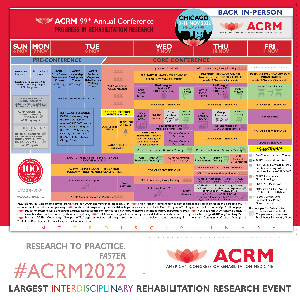Back
Brain Injury
Quality of Life in African-American Survivors of Traumatic Brain Injury Based on Relationship Pre-and Post-Injury
Wednesday, November 9, 2022
3:48 PM – 3:53 PM
Location: Station 8

Naghmeh Moadab (she/her/hers)
Postdoctoral Neuropsychology Resident
Rehabilitation Institute of Michigan
Glen Allen, Virginia, United States
Presenting Author(s)
Research Objectives: To examine the quality of life of African American survivors of traumatic brain injury (TBI) in relation to their relationship status with a significant other pre- and post-injury.
Design: correlational
Setting: Virginia Commonwealth University
Participants: 18 adults of African American ethnicity with moderate/severe TBI. Participants were a subset of enrollees in the TBI Model Systems (TBIMS) National Database, as well as referred from Brain injury community services in Virginia and North Carolina. Mean age was 40.01 years (median age was 37.48; range = 29-58 ). Inclusion criteria included at least 18 years of age, survivors had to be in a relationship with a significant other pre-injury, either unmarried living separately or cohabitating, or married with a spouse, and at least 5 days of hospitalization followed by inpatient rehabilitation services.
Interventions: Not applicable
Main Outcome Measures: The survivor’s perceived quality of life was measured by domains in the Quality of Life After Brain Injury (QOLIBRI), as well as completed intervention of Cultural Family Intervention After Brain Injury (CFIaBI).
Results: There were no statistically significant correlations between longevity of a relationship (pre- and post-injury) and the survivor’s perceived relationship satisfaction, personal functioning, and negative emotions/feelings. However, exploratory analyses revealed demographic differences. Males exhibited more positive views for the future (p = .042) and higher depression levels than females (p = .050).
Conclusions: Comparisons with gender of African American survivors of moderate/severe TBI yielded males having more positive views of the future while also endorsing higher levels of current depression, compared to their female counterparts. Possible explanations and implications will be discussed.
Author(s) Disclosures: Archival data retrieved via principal investigator, Dr. Kelli Gary, from a proposed grant (#90SF0014-01-00) that was funded by the National Institute of Disability, Independent Living, and Rehabilitation Research (NIDILRR).
Design: correlational
Setting: Virginia Commonwealth University
Participants: 18 adults of African American ethnicity with moderate/severe TBI. Participants were a subset of enrollees in the TBI Model Systems (TBIMS) National Database, as well as referred from Brain injury community services in Virginia and North Carolina. Mean age was 40.01 years (median age was 37.48; range = 29-58 ). Inclusion criteria included at least 18 years of age, survivors had to be in a relationship with a significant other pre-injury, either unmarried living separately or cohabitating, or married with a spouse, and at least 5 days of hospitalization followed by inpatient rehabilitation services.
Interventions: Not applicable
Main Outcome Measures: The survivor’s perceived quality of life was measured by domains in the Quality of Life After Brain Injury (QOLIBRI), as well as completed intervention of Cultural Family Intervention After Brain Injury (CFIaBI).
Results: There were no statistically significant correlations between longevity of a relationship (pre- and post-injury) and the survivor’s perceived relationship satisfaction, personal functioning, and negative emotions/feelings. However, exploratory analyses revealed demographic differences. Males exhibited more positive views for the future (p = .042) and higher depression levels than females (p = .050).
Conclusions: Comparisons with gender of African American survivors of moderate/severe TBI yielded males having more positive views of the future while also endorsing higher levels of current depression, compared to their female counterparts. Possible explanations and implications will be discussed.
Author(s) Disclosures: Archival data retrieved via principal investigator, Dr. Kelli Gary, from a proposed grant (#90SF0014-01-00) that was funded by the National Institute of Disability, Independent Living, and Rehabilitation Research (NIDILRR).
Learning Objectives:
- list practices related to improving quality of life pertaining to romantic relationships and overall rehabilitation trajectory in African American individuals with moderate/severe TBI.
- describe factors that have been perceived as negatively impacting romantic relationships post-TBI injury.
- describe how longevity of a marriage, before and after a brain injury, can impact the survivor's quality of life and relationship.

.jpg)
